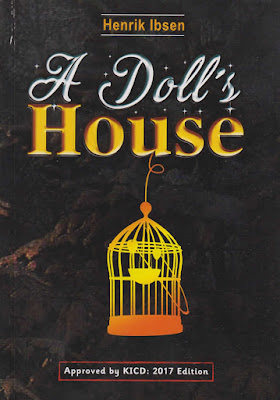THE PEARL QUESTIONS
AND ANSWERS
In this article we explain frequently asked questions in The Pearl by John Steinbeck. The questions are meant to guide KCSE candidates.
These
notes should serve as a complementary resource to students who have read and
mastered on events in the pearl.
1. What is
the main theme in the pearl by John Steinbeck?
The main theme in The Pearl
is the theme of greed. Kino lives a humble life of contentment before he finds
the pearl.
When he finds the pearl, he envisions a better
life for his family, which has wallowed in abject poverty for many years. His ambitions
include marrying Juana in church, buying new clothes, a harpoon, a Winchester Carbine
rifle and above all education for his son Coyotito (pg44-46).
Kino’s ambitions grow
wildly into uncontrollable greed that yields misfortune for him and his family.
He ends up losing his valued canoe and his brushwood hut. He is also attacked
several times. The deceptive nature of the pearl causes a strain in the happy
marriage when he attacks Juana after she attempts to throw away the pearl. The
family suffers untold grief when they lose their son Coyotito who is shot
by a tracker who was after the pearl.
Greed is also exhibited by
characters such as the priest, the, the pearl buyers, the doctor and some
veiled figures that attacked Kino with the view of getting the pearl.
Clearly, a poor man who is
contended is happier than a man of means who harbours excessive ambitions.
Nothing good comes out of greed.
Desire without
limit causes agony.
2. What is
the message in the pearl?
John Steinbeck’s The pearl
is a parable. It discourages greed and encourages contentment.
3. What is
the moral lesson in The Pearl?
Excessive ambitions lead to
pain/agony. Kino’s unchecked desire results in loss of property, anguish and
death.
Contentment is the key to a
happy life. Kino chases elusive happiness ostensibly brought by owning
material wealth and formal education but instead sinks deeper into poverty
and agony.
We may lack money but still
be happy. Peace of mind is more important than riches.
Also, all that glitters is
not gold.
4. Who did
Kino kill?
Kino kills a man who
attacks him at the beach. This is after Juana tries to throw away the pearl because it’s evil
(pg. 35). She does so because several people have tried to attack Kino in order to get the pearl. Kino catches
Juana and beats her badly (pg. 34). While returning to his house, he meets
attackers on the path and the altercation that ensues leaves one man dead.
Juana tells Kino, “You have killed a man.”
He also kills three trackers at the mountains. (Pg 115)
5. Does
Kino die in the pearl?
Kino does not die in the pearl. The story ends when he flings the pearl back into the sea when Coyotito dies. (Pg.118)
6. What
does the doctor give Coyotito?
The doctor gives Coyotito a white powder enclosed in a capsule of gelatine. He washes it down with pulque (pg. 52). This results in untold pain for Coyotito (pg.54).
He poisons Coyotito in order to reap maximum gains from the pearl.(pg. 56)
He tries to trick Kino into giving him the pearl.
"Perhaps you would like me to put it in my safe." (pg. 56)
7. Why
does Juana want to get rid of the pearl?
Juana wants to throw away
the pearl because it’s evil (pg.59). She wants them to throw it back to the sea
before it destroys them. She says this after a thief tries to steal the pearl
and Kino is hurt while trying to protect it.
Kino
is attacked the second time and slashed. Juana tells him (pg. 79) “Kino this pearl
is evil; let me destroy it before it destroys us”.
She tries to throw it away
but Kino manages to catch her and stop her (pg. 83).
8. What is
the main conflict in the pearl?
The protagonist Kino fights many evil forces. When he finds the pearl, he thinks that everyone is happy
for him. When the news of his magnificent pearl spreads, everyone starts
scheming how to benefit from the pearl (pg. 43). Everyone is interested in
Kino’s pearl; the priest, the shopkeeper, the doctor, the beggars and the
sellers.
There is a conflict between
good and evil. Kino fights against himself. He is overwhelmed by the evil
nature of greed. He is blinded by unchecked ambitions and as fate would have it,
he ends up losing everything he valued including his peaceful life and his son.
(pg.115)
9. Who
killed the baby in The Pearl?
Coyotito is shot and killed
by one of the three trackers. The trackers were startled by a little murmuring
cry that sounded like a human baby. They thought it was a coyote. The man shot
in the direction of the cry and killed Coyotito. (pg. 114-115)
“If
it’s a coyote this will stop it” (Pg. 115)
NB: Coyotito does not die from scorpion sting or the white powder administered by the doctor.
He was not
killed by Kino.
10. How
does the pearl end?
The Pearl ends when Kino flings back the pearl into the sea.
“And the music of the pearl shifted to a whisper and disappeared.” (pg. 118)
Let's attempt these essay questions based on the Pearl.














